Our 1995 story on the recently retired evangelist recounts how he labeled Hinduism as “demonic” and advocated keeping Hindus out of America
When the preacher Pat Robertson announced his retirement at age 91 in September, 2021, we felt compelled to rerun this article from our July 1995 issue recording his attitudes and efforts to impugn other religions—Hinduism in particular. Multi-millionaire Robertson is chairman of the Christian Broadcasting Network and chancellor of Regent University.
By Dr. Julie Rajan, New Jersey
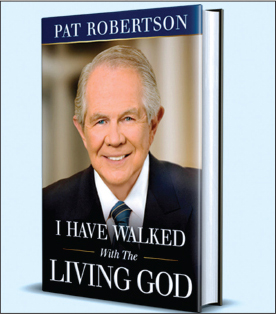
It was not unusual for pat robertson’s Christian TV show, “The 700 Club,” to portray other religions in a less than complimentary light. Jews, Muslims and occasionally Hindus are singled out for a scathing recounting of their spiritual errors. Still, I was shocked to see Robertson on his March 23, 1995, show label Hinduism as “demonic” and advocate keeping Hindus out of America. My concerns intensified when President Clinton later implicated hateful talk in the fatal Oklahoma City bombing in April, 1995.
Robertson was already a well-known figure in the conservative Christian community when his 1988 bid for the US presidency shot him into national attention and effectively anointed him leader of the Christian right wing. Talented and industrious, he is head or founder of numerous organizations, including a 1,400-student university. His political action group, the 1.4-million-member Christian Coalition, has decided influence in a Republican-controlled Congress.
Christian evangelists regularly slander Hinduism with little impact beyond their own flock [see Hinduism Today, February, 1989]. But when a national figure like Robertson does it on a widely watched TV program, that’s different. The March 23rd episode details Robertson’s conversion of some Hindu people of Rajahmundry in Andhra Pradesh, India, to the Christian religion. In the course of the show, Robertson makes shameful, un-Christian accusations against the Hindu faith, the world’s oldest religion. When contacted, Mr. Robertson’s office told us he was “unavailable for comment.” To begin, Robertson’s experiences in Rajahmundry are described by a narrator. The scene is of a poverty-stricken people, bathing in the river at the head of which rests a statue of Lord Siva. Water is pouring out of Siva’s head and a snake is wrapped around his head as well. Robertson and his son are found in the midst of the scene, observing and mocking the early morning prayers of Hindus. As they witness the scene, they make incorrect reference to the river as “Siva’s sperm,” and claim that the people “were supposed to wash away their sins in the sperm of the God.”
Robertson goes on to characterize Hinduism as having evil tendencies toward random spiritual worship and polytheism. Mr. Robertson’s son and fellow evangelist, Gordon, stated disparagingly, “Whenever [Hindus] feel any sort of inspiration, whether it’s by a river or under a tree, on top of a hill, they figure that some God or spirit is responsible for that. And so they’ll worship that tree, they’ll worship that hill or they’ll worship anything.” What was even more regrettable was Robertson’s assertion of some connection between idol worship and the poverty in India. Robertson does not deny his son’s claim that “Wherever you find this type of idolatry, you’ll find a grinding poverty. The land has been cursed.”
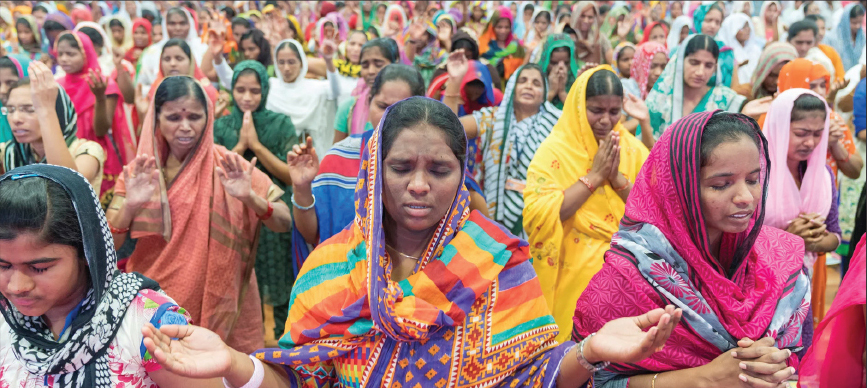
But if the argument of poverty as the curse of India is not enough for the American audience of “The 700 Club,” they next hear Hinduism boldly labeled “demonic.” Robertson says, “Siva [is] the God of Destruction, and his consort [is] the Goddess of death [Kali]—that black, ugly statue there with all those fierce eyes.” He then suggests that the evil tendencies of death and destruction can be found in those who worship the Deities: “I mean these people are out to kill other human beings in the name of their God.” They mention in support of this conclusion the Aum Shinrikyo sect in Japan, the eccentric Buddhist-based organization that was likely responsible for subway gas attacks in Tokyo earlier this year. Their icons, unfortunately, included Siva—sure proof, goes the Robertson thinking, of demons at work.
“Although Hinduism admits that different beings and entities can perform what we might consider evil acts,” corrects Dr. Arvind Sharma, Birks Professor of Comparative Religion at McGill University, Toronto, “there does not seem to be a single entity such as the Christian devil in Hinduism.” And since there is no practice of evil or concept of the devil in Hinduism, “To call Hinduism demonic,” concludes Dr. Sharma, “is really demonic.”
By accusing Hinduism of being demonic, Robertson is merely reinforcing the age-old stereotype that has been placed on the Indian culture by the West. “That’s been standard operating procedure missionaries have used ever since they invaded India in the 19th century,” explains Dr. Gordon Melton, Director of the Institute for the Study of American Religions. “In approaching Eastern religions and African religions, it has been the stance of most conservative Christians that the deities of those religions are, in fact, personified demons. And that perspective goes back to the Jewish encounter with the Caananite culture millennia ago as described in the Bible.”
Dr. Kusumita Pedersen, Director for the Project on Human Rights and Religion, similarly observes that Robertson has employed “almost every negative image and cliche that has been used about Hinduism since the 18th century.”
As the show unfolds, we finally arrive at the real intention of Robertson’s missionary trip to India: to convert Hindus to the Christian faith. A narrator describes the scene of the conversion in which thousands of Hindus were “set free from a lifetime of fear and demonic oppression. The scene was overwhelming.” Actually, the scene is oddly over-dramatic. Why would thousands of people in a split second throw away their entire way of life that has been passed down over the centuries, because of a brief speech given by a stranger from another country? Although Robertson mentions the naturally deep devotion of the Hindus, he apparently fails to appreciate that any religious preacher in India gets the same reception, whether Christian, Hindu, Jain, Sikh or Buddhist—though it does help to be white, American, famous and rich.

It is also apparent he was frustrated with the Hindu ability to just absorb one more God. “I preached to them the second commandment about idolatry. You know, ‘They shall hold no other Gods before me,’ and number two, ‘You shall not fall down or make any idols of anything.’ Many people accept Christ, but they still go with those processions down to those riverbanks. We followed along with the crowd and I said, ‘You’ve got to give that up.’”
Political Agenda
The program used common stereotypes of Hinduism (as well of as other prominent non-Christian religions in America) to create fear among the American people of non-Christian religions. What is the purpose behind those tactics?
Judging from Michael Little’s, President of the Christian Broadcasting Network, comments on the show—“There are so many opportunities for us to take programs which will reach the people of India,” and “Help us carry the light to a nation in darkness”—it is obvious that one strategy of “The 700 Club” is to gain support and money (so named after achieving its original goal of 700 donors). “Give us a hand on this [India],” pleads Robertson at one point, “because it’s a big one.” But that is just part of the plan.
Robertson’s true thinking is revealed in his 1991 book The New World Order. That novel discloses a secret, nefarious plan being followed by the present political leaders of the world. Robertson labels that plan the “New World Order,” which he sees as the formation of a one world government, one police force, one judicial system, and one economic market. Robertson claims that in this “new world government no one could speak out against the beliefs of a Muslim, a Hindu, or an animist. What we know as the freedom of religion would be taken away, and Christians would be muzzled.”
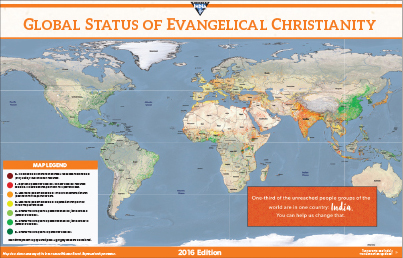
Robertson has another vision of the future, one is which “God sweeps away the pretense of the satanic and man-made counterfeits and announces His New World Order, and His anointed leader, Jesus the Messiah.”
Robertson stated in The New World Order: “The media challenged me. ‘You’re not going to bring atheists into the government? How dare you maintain that those who believe the Judeo-Christian values are better qualified to govern America than Hindus and Muslims?’ My simple answer is, ‘Yes, they are.’”
Mr. David Cantor, Senior Research Analyst of the Anti-Defamation League, points out that such “religious tests for office are unconstitutional. It’s not just a purely a religious statement. It’s a political statement.”
The Human Rights Issue
“In the discussion of human rights, there are different positions on the right to free speech or freedom of expression. The extreme position, that is sometimes called the ‘American position,’ is total freedom of speech,” explains Dr. Pedersen. “As Americans, we believe that even the most offensive and the most incendiary statements should be allowed in the name of freedom of expression, because once you start to legally restrict the freedom of speech, you are on a slippery slope of restricting all kinds of speech on different political or ideological ground.”
Dr. Pedersen feels that such anti-Hindu statements may refer back to the 1920s, at a time when the Ku Klux Klan (a Christian white-supremacist group advocating violence against Black Americans) was on the rise, and the national belief was that all Americans must be Christians. During the 1920s, immigration laws prevented European immigrants from entering the United States. Eventually Europeans were allowed to immigrate, and by 1965 Indians were included in immigrant quotas.
However, in the 1990s, some feel that the multicultural immigration has caused a backlash in American society in the form of racial discrimination between various cultural groups. In the wake of such discontent, Peter Brimelow has recently written a book called Alien Nation which attacks multiculturalism and its negative effects on American society. Something must be done, Brimelow advocates, to prevent white people from becoming a minority in America.
“What Robertson is really saying is that Hindus shouldn’t be allowed to come to the United States,” evaluates Dr. Pedersen. “All of the Hindu engineers, doctors and computer experts who are living here should go home. This is a very big statement that he has made.”

Even Christians are concerned with Robertson’s manner of preaching Christianity. Sister Mary Elizabeth Moore, a Professor at Claremount’s School of Theology, feels that Robertson may be overstepping his boundaries as a Christian. “I have been very distressed that Pat Robertson and others like him have used the gospel to preach condemnation of others, to judge harshly, to demonize people in other faiths and to demonize some Christians with whom they don’t just happen to agree,” expresses Sister Moore. “I think that’s absolutely counter to the gospel of Jesus Christ.”
Hinduism is not the only religion under Robertson’s extremist attack; The New World Order is filled with anti-Semitism. However, Ms. Nancy Israel of the American Jewish Committee notes that Robertson is slowly transforming. “He’s being very careful now,” observes Ms. Israel, who is from the Pittsburgh chapter of the American Jewish Committee. “Up until now he’s been able to say what he wanted to say. He’s been forced to back off because of this public spotlight and because he’s decided to make the Christian Coalition a more mainstream organization.”
What Should We Do?
It is true that if our Hindu faith is challenged, perhaps we will become more aware of its teachings. If that is so, we can view “The 700 Club” attack on Hinduism as a blessing in disguise. “I would say that anytime we see the extreme of a religious community, we see warning signals that need to be taken seriously,” agrees Sister Moore. “Those signals usually reveal something of the larger religion, something of the possibility of distortions that people need to worry about. These distortions can stir other people who have more whole views of the religion to express and live their faith more fully.”

We should use this opportunity to profess and understand our Hindu faith more fully. We as Hindus need to respond to and erase Western stereotypes and hate speeches against our religion. There are many ways to accomplish that. We can articulate our complaints through letters, phone calls and petitions to the government offices, such as the Justice Department Hate Crimes Division. The Indian government could express its concern, as it did for Hindus in South Africa for years. And we can bring such statements into the light of public discussion by filing complaints with the Anti-Defamation League. The Anti-Defamation League was established in 1913 by B’nai B’rith, a Jewish service organization. The League and its parent organization defend human rights, promote intercultural relations, provide for the religious and cultural needs of Jewish college students, sponsor Jewish education among adults and youth groups and carry on a broad program of community service and welfare. They confer with governments and the UN on civil rights, immigration, abuses of freedom by totalitarian states, the position of Israel and problems affecting Jews throughout the world.
Dr. Pedersen feels that perhaps we can form our own protection league: “I recommend the formation of a Hindu anti-defamation program which will monitor these kinds of statements in the press and the media, and will gather accurate information and will speak out when something should be protested.” In that way, perhaps the entire Hindu public will be constantly made aware of any false allegations made against our religion, and efforts to respond can be coordinated.
Dr. Jayaraman, executive director of Bharat Vidya Bhavan in New York, feels that the way to dispel Hindu stereotypes is to teach the common American man about our religion. “Indian philosophy should be taught methodically, either in the school system or by speakers prepared to go around the country to talk just like these missionaries,” suggests Dr. Jayaraman. “In every city, in every state they should have such speakers, powerful speakers who can say with authority, ‘This is Hinduism. What you are saying is wrong.’” Dr. Jayaraman also suggests that small books discussing true Hindu philosophy be freely distributed to the public.
But the main way to break down anti-Hindu sentiments is by educating our children and ourselves more about Hinduism. Such understanding will place us in a better position to combat ignorant statements.
“Because Hindus take a generous view of other religions, they think that others will take a generous view of theirs,” observes Dr. Sharma. “And even when others attack them, because of their basic nature, they don’t take it to heart.”
According to Dr. Pedersen, comments such as Robertson’s should be taken seriously. During the annual dinner given by Human Rights Watch, an international panel monitored by Peter Jennings discussed whether hate speech should be restricted or banned. “The next step after this truly disgusting defamation [by Robertson] is what these human right activists on the panel call ‘the speech of instigation,’” recounted Dr. Pedersen. The ‘speech of instigation’ is a build-up for murder and genocide. It happened in Rwanda. The press and media started to build up a rhetoric that so and so should be killed. After that went on for some months, so and so started getting killed. There is a line to be drawn somewhere on free speech, but we as Americans just don’t know quite where yet.”
Keeping that in mind, perhaps we should turn our thoughts to the 1995 bombing of the Oklahoma City federal building. After the bombing, President Clinton spoke out against hate speeches, making a clear connection between hate speeches, propaganda and the bombing. The seeds of hate may blossom into the weeds of violence. Therefore, it is important that we take early and strong action against ignorant and hateful comments such as those made by Robertson. If we don’t, we will one day face more than Mr. Robertson’s hateful words.
“The Hindu faith has absolutely nothing to do with God!”

After reading the above article from Hinduism Today’s July, 1995, issue, Bharat J. Gajjar of Washington wrote to Robertson’s Christian Broadcasting Network protesting the vicious attacks by its star performer. He received the following apparently personal letter, dated August 4, 1995, from Robertson:
Dear Bharat,
Thank you for contacting CBN concerning our program presentation on Hinduism. I appreciate this opportunity to respond to you.
I’m sorry you objected to my comments. It is not my intent to offend anyone because of their religion, and I want you to clearly understand that I do believe in religious freedom. It is guaranteed in the Constitution of the United States and everyone has the right to believe as they wish. However, though I respect the rights of others, please understand that I have a responsibility to speak the truth. The truth is that the Hindu faith has absolutely nothing to do with God! The Bible tells us that there is only one way to hit the mark and that is to come to Jesus Christ. Jesus said in John 14:6, ‘I am the Way, the Truth, and the Life:
NO MAN COMES TO THE FATHER, BUT BY ME.
I don’t make the rules—God makes the rules. He said if you don’t come through Jesus Christ, there is no entrance into heaven. Those who believe they can come to God any other way, whether it be by New Age, Hinduism, Mohammed, or through any other person or thinking, are being deceived.
It is our continual prayer at CBN for all people to come to a saving knowledge of the truth of the Gospel of Jesus Christ. God is not willing that any should perish. Thank you again for this opportunity to respond to you.
Yours in Christ, Signed: Pat Robertson
The letter attracted the attention of Hindu renaissance leader Ram Swarup in India whose “A Reply to a Reply” was published in the December, 1995 issue of Hinduism Today (bit.ly/Swarup-Robertson). As with the original article, Swarup’s commentary remains equally relevant today.
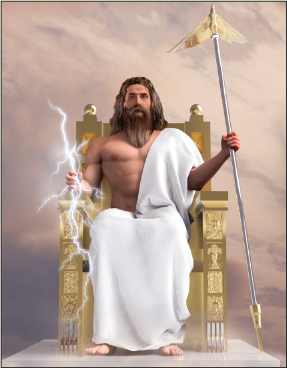
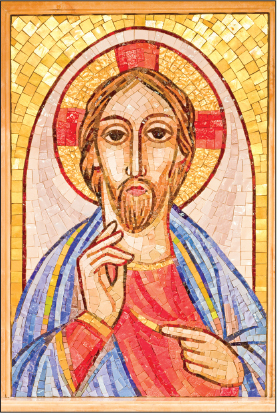
Hinduism Today’s coverage of Mr. Pat Robertson was comprehensive. While he deserved it for his importance in the public life of his country, it also helped the American Hindus to become better aware of the environing ideological forces they would by habit have neglected.
Mr. Robertson invited many critical comments from the Hindus. To one such Hindu critic, Bharat J. Gajjar, Robertson replied. This reply is as important to the American Hindus as his earlier TV statement which Hinduism Today reported. The reply is in some ways more than a fulmination. It is a credo, an ideological statement and deserves a different kind of notice. Moreover, Robertson’s mental blocks are not his alone but widely shared. Therefore, to discuss them would be all the more useful. I shall therefore reply to his reply here.
In his letter to Mr. Gajjar, Robertson says that he had no intent “to offend anyone,” and that he wants it to be understood that he believes in “religious freedom”—this is reassuring after his previous performance. But he also adds that while he respects the rights of others, he has “a responsibility to speak the truth.” He tells us that “the truth is that the Hindu faith has absolutely nothing to do with God!” He adds in lively Americanism that “there is only one way to hit the mark and that is to come to Jesus Christ. Those who believe they can come to God any other way, whether it be by New Age, Hinduism, Mohammed or through any other person or thinking—are being deceived.” At the end, he modestly states, “I don’t make the rules—God makes the rules.”
The reply is brief but rich in traditional Christian theology. It reveals in a clear profile the unchanging face of Christianity, a Christianity which still lives in medieval times and refuses to change. It gives in a few sentences the most important elements of Christian theology: a single or exclusive God, an equally single and exclusive channel of reaching him and a conception of truth which requires no self-preparation, a truth which is ready-made and can be had by simply looking up a particular book.
Biblical God
First, about Hindus having no God, though they have more often been accused of having too much of it, let us readily admit that Hindus do not have a God of the Biblical tradition, the God of Robertson’s familiarity. Their God is not Jehovah, an exclusive God, a jealous God, a God that denies other Gods. In the Vedas, the oldest scripture of the Hindus, Gods are often invited to “come together.” They are praised “conjointly” and it does not offend any one of them. Vedic Gods live in friendliness, they do not deny each other.
This approach was shared by the Chinese, Egyptians, Greeks, Romans and most other advanced cultures and peoples. The Greeks had no difficulty in recognizing their Gods in the Gods of the Hindus. It is the Semitic tradition which sees their devils in the Gods of others.
This negative view derives from another basic Biblical concept—that their God is the only one, the only true God. True, this view implies that there are other Gods, but it is freely and repeatedly stated that they are “false,” they are “abominations,” and they are to be dethroned.
Hindus have no God of this description. True, they too often describe their God as one, ekam, but they also call Him many, aneka. Strictly speaking, Hindus do not believe in one God, they believe in one Reality, ekam sat. They do not say “there is only one God;” they say “God alone is.” The unity of Hindu God is spiritual, not numerical. He pervades all. He is one in all and the same in all. He is also beyond all. Semitic religions have no such concept. Hindu spirituality is mystical and theological, not credal and ideological.
Exclusive Intermediary
Now we turn from an exclusive God to an exclusive savior. The two stand together. In this too, Robertson is saying nothing new, but repeating the old Christian doctrine of “No salvation outside the Church,” now modified in this ecumenical age to “No salvation without Jesus Christ.” In his support, he quotes the Bible as his authority. This is a curious way of arguing. You assume what you have to prove, put it in your own book and then cite it as your authority. It would be considered dull-witted in a sophomore, but in a Christian preacher it makes a bright and clinching argument.
Revelatory religions work through mediators and intermediaries. In these ideologies, first there is a God of strong preferences and hatred. He chooses a people, but even to them He does not reveal himself directly. He makes His will known to them through a favored intermediary who in turn has His apostles to broadcast His message. The next link in the chain are evangelists—read “televangelists” in the modern conditions. The message is received by one but preached and relayed by others who had no share in the revelation. Their merit is greater if they do it with strong hands and in perfect faith and are troubled by no intellectual scruples or conscience.
In this, too, the Hindu tradition differs completely. In this tradition, God resides in man’s heart, and He is accessible to all who seek Him in sincerity, truth and faith. In this tradition, God is man’s own innermost truth and the seeker finds Him in the cave of his heart. In this tradition, God reveals Himself directly to the seeker and needs no specially authorized savior, no go-betweens.
Here we may also make another point. Since Hindu spirituality recognizes God in man, it also recognizes great goodness in him. On the other hand, ideologies which deny man’s sacred Godliness also deny his essential goodness. They find man basically sinful, and unfortunately also treat him so. Of course, no one need deny that there is much in man which is not Godly, but let us not make it into a dogma of the depravity of human nature. Let us also become aware of man’s other dimension, his Godliness and goodness.
Soul
Searching Hinduism teaches that as one goes deeper into oneself, one meets deeper Gods. An external and impure mind gives only external Gods. This leads us to Robertson’s idea of truth and his responsibility to speak it. In Hindu conception, one’s truth cannot be greater than one’s seeking. In this conception, truth does not lie in some quotable passages of a book. It has to be known through a culture of the spirit, through great seeking, tapas, purity and self-inquiry. Let Robertson himself find whether he fulfills this condition.
Hindu spirituality is yogic. It is found everywhere, though not always equally developed. It is found among the wise men of Egypt, Greece, Mexico and China. Today, it is in its most preserved form in Hinduism. Hinduism preserves the ancient wisdom of many nations and cultures, their Gods and their insights which they lost under the onslaught of monolatrous creeds. Spiritual humanity needs renascent Hinduism for its self-revival.
Robertson wants to keep out Hindus from America. But would he be able to keep out Hinduism from the seeking humanity? Hinduism resides in all seeking hearts; and whenever man’s seeking for Gods becomes spiritual, Hinduism, or the tradition of Sanatana Dharma, automatically comes in. In what way and how long could man’s innermost truth be kept away from him?
What the Robertsons Said About Hinduism
Excerpts from the March 23, 1995, broadcast of the 700 Club:
Robertson: “India is breaking free from the old, and moving into the Western culture. But what that leaves is a spiritual vacuum. And there seems, finally in India, an opening to the Gospel of Jesus Christ throughout this whole land. There is a huge population of teenagers. They’re looking for something new and better.”

Cohost: “We’ve seen in other countries where there’s a certain period of vulnerability, or spiritual vulnerability. Now’s the time to use the media to talk to them about what their future could really be like.”
Robertson: “Of all of India’s problems, one stands out from the rest. That problem is idol worship. It is said there are hundreds of millions of Hindu deities. All this has put a nation in bondage to spiritual forces that have deceived many for thousands of years.”
Gordon Robertson (Pat’s son, pictured above): “Wherever you find this type of idolatry, you’ll find a grinding poverty. The land has been cursed. The Bible talks in terms of the land being cursed on behalf of what the inhabitants have done to it. You erect all these idols under every green tree, on top of every hill, you’re going to curse your land. And the oppression, we see it in evidence.”
CBN Reporter: “[At the religious services Robertson conducted in India] they came, by the thousands, to a makeshift altar to confess their faith in Christ and receive a touch from heaven, and be set free from a lifetime of fear and demonic oppression.”
Robertson: “I [told] them to renounce idolatry, but many people accept Christ and still go with those [Hindu] processions.
Cohost: “You said there’s a connection between the New Age in America and Hinduism.”
Robertson: “It’s the same thing. The whole concept of Hindus is based on karma; that people have a karma attached to them when they are born, and they go through a cycle of life and they come back in the next world as something else. The whole thought of reincarnation is karma—you come back as a cow, a pig, a goat, a dog, a snake or an Untouchable. We’re importing Hinduism into America. The whole thought of your karma, of meditation, of the fact that there’s no end of life and there’s this endless wheel of life, this is all Hinduism. Chanting too. Many of those chants are to Hindu Gods—Vishnu, Hare Krishna. The origin of it is all demonic. We can’t let that stuff come into America. We’ve got the best defense, if you will—a good offense.”
About the Author
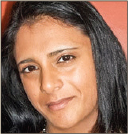
Julie Rajan is today Associate Teaching Professor in the Department of Women’s, Gender, and Sexuality Studies at Rutgers University-NB. Her research interests include: women’s human rights; women and violence in conflict; colonial, post-colonial, and modern-day imperialisms; and terrorism and resistance.
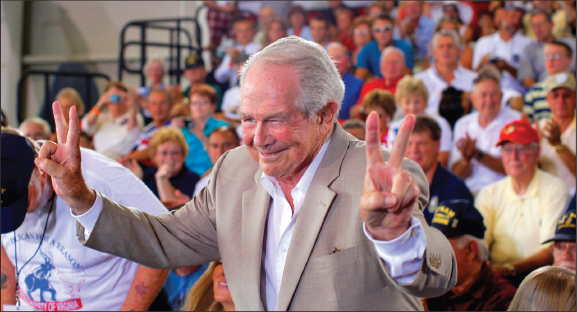
Mr. Robertson is not remotely interested in any faith but his own. He considers his own to be the only ‘true’ religion. He knows little to nothing of Sanatana Dharma. One cannot have a friendly conversation about beliefs with such a person. His mind is not open and to him, we are either in league with demons or with Jesus Christ. We cannot waste time with such people. I grew up with these type of people and a friendly hello or good day is all the interaction I care to have with them.
If the bible is to be used as he mentioned where God Makes the rules, they should address the many instances where the bible clearly states that you shall be put to death.
Use the book in its entirety not just the parts that are easy to convince the flock.
Here are just a few instances , Lev 20:10, kill adulterers, Kill anyone who sins: Ezek 18:4, Kill anyone who curses God: Lev 24:16, Kill Children: Dt 21:20. There are over 25 instances in the Bible where violence and killing is mandated.
That’s just a few, Yet the same book states : “thou shall not kill”, how can someone follow a book that contradicts itself?, centuries of editing a book to control man and spread doctrine all to gain power..
I am in no way inciting further argument, but to bring exposure to false so called prophets that use football analogy to justify the sad state America is in.
I have to ask respectfully why HinduismToday has a history of reporting (including op-eds) on Pat Robertson as if that man were the Pope or the Archbishop of Canterbury? His audience has always been small and typically elderly. There are actual Christian apologists who would make for more interested reading, like Mike Licona, Gary Habermas, William Lane Craig and others who are far more representative of Christianity than the guy from the 700 club. It just comes across as low-hanging fruit. Also, the Bible does not say “kill anyone who sins”, since that would have included the entire human race.